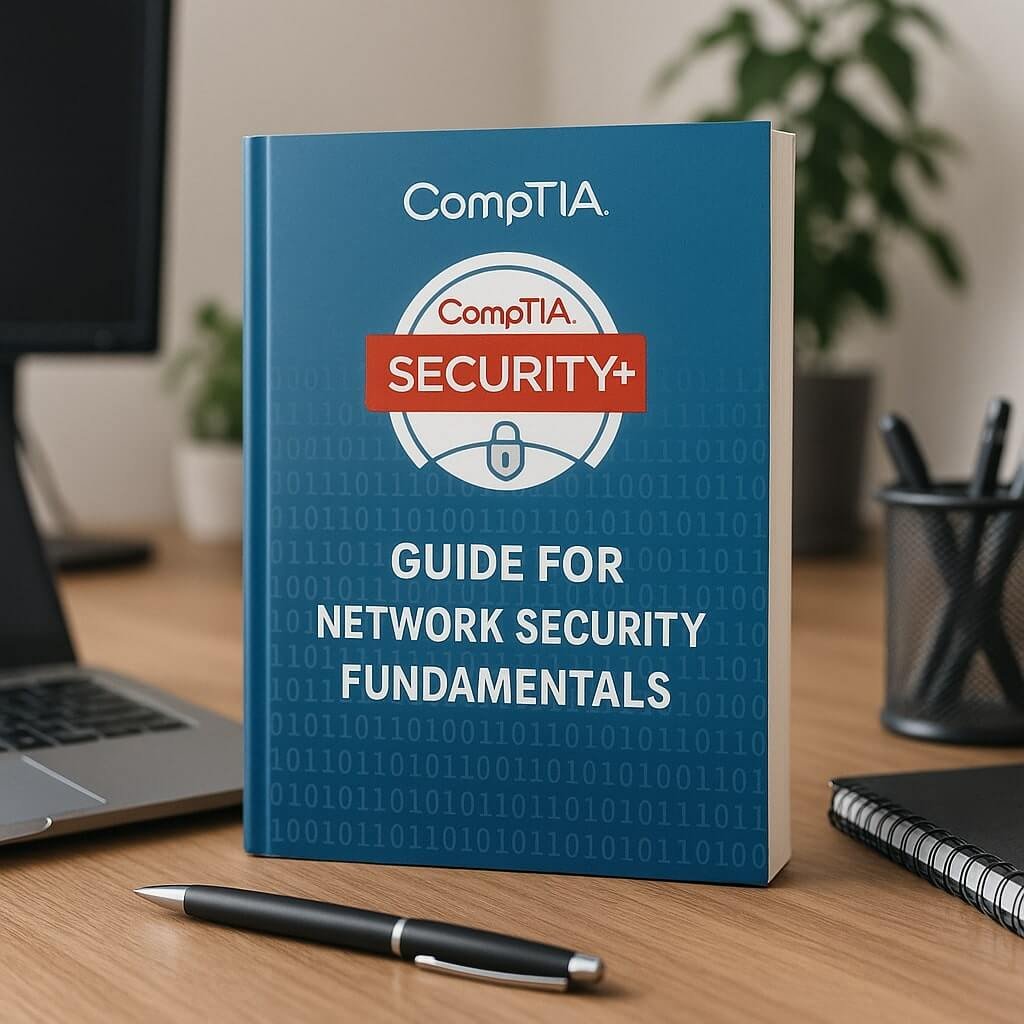When considering a career in IT, understanding the key differences between CompTIA A+, Network+, and Security+ certifications is essential. Each certification targets specific skills and knowledge areas, shaping your professional trajectory. A+ lays the groundwork in IT fundamentals, while Network+ dives into networking intricacies, and Security+ focuses on cybersecurity principles. Knowing which certification aligns with your career goals can greatly influence your path. So, which certification will best suit your ambitions?
Key Takeaways
- CompTIA A+ focuses on foundational IT skills, while Network+ specializes in networking knowledge and Security+ centers on cybersecurity concepts.
- A+ certification prepares for roles like IT support, whereas Network+ targets network administrators, and Security+ leads to cybersecurity positions.
- A+ covers hardware, software, and troubleshooting, Network+ addresses network protocols and configurations, and Security+ emphasizes risk management and compliance.
- A+ requires two exams, Network+ has one exam, and Security+ also consists of one exam, all with a maximum of 90 questions.
- A+ enhances user support skills, Network+ improves networking capabilities, and Security+ validates expertise in protecting organizational data and assets.
Overview of CompTIA Certifications
CompTIA certifications serve as a benchmark for IT professionals seeking to validate their skills and knowledge in various domains. By obtaining these credentials, you gain significant certification benefits that enhance your employability and career prospects.
Not only do these certifications demonstrate your proficiency in essential IT concepts, but they also provide you with a competitive edge in a crowded job market. Industry recognition plays an important role here; employers often seek candidates with recognized certifications, as they reflect a commitment to professional development and adherence to established standards.
Whether you’re aiming for roles in networking, security, or support, CompTIA certifications can effectively showcase your expertise and bolster your professional credibility, making you a more attractive candidate to potential employers.
Purpose of CompTIA A+ Certification
The CompTIA A+ Certification equips you with essential IT skills that form the foundation of your technical career.
You’ll gain a thorough understanding of both hardware and software components, which is vital for any IT professional.
Additionally, mastering troubleshooting techniques will enable you to effectively resolve issues, enhancing your problem-solving capabilities in real-world scenarios.
Fundamental IT Skills
Earning the CompTIA A+ Certification equips you with essential skills for a successful career in IT support and troubleshooting.
This certification covers basic troubleshooting techniques, enabling you to effectively diagnose and resolve common hardware and software issues. You’ll learn to systematically approach problems, enhancing your efficiency in technical environments.
Additionally, understanding networking fundamentals is vital; A+ certification provides a foundational grasp of network configurations, protocols, and security measures. This knowledge allows you to assist users with connectivity issues and implement basic network solutions.
Hardware and Software Knowledge
While maneuvering through the complexities of IT support, having a solid grasp of hardware and software is essential for success. CompTIA A+ certification emphasizes this knowledge, equipping you with the skills necessary to tackle real-world challenges.
Here are some critical areas you’ll focus on:
- Understanding various hardware components, such as CPUs, motherboards, and storage devices
- Installing and configuring operating systems and software applications
- Recognizing compatibility issues between different hardware and software
- Performing upgrades and replacements of hardware components
- Managing software applications through installation, updates, and troubleshooting
Mastering these aspects not only enhances your technical proficiency but also prepares you to respond effectively to customer needs, making you a valuable asset in any IT environment.
Troubleshooting Techniques Overview
Effective troubleshooting techniques are essential for IT professionals, and CompTIA A+ certification equips you with the skills to diagnose and resolve a wide range of technical issues.
You’ll learn various troubleshooting methodologies, including the systematic approach of identifying problems, establishing a theory, testing solutions, and documenting findings. This structured process helps you efficiently isolate and fix issues, minimizing downtime.
Additionally, you’ll gain proficiency with diagnostic tools such as network analyzers, multimeters, and software utilities that aid in identifying hardware and software faults.
Mastering these techniques not only enhances your problem-solving abilities but also prepares you to address real-world challenges effectively.
Ultimately, the A+ certification guarantees you’re well-equipped to support diverse IT environments.
Core Skills Covered in A+ Certification
The A+ Certification equips you with essential skills required for a career in IT support and technical troubleshooting.
By mastering the A+ exam objectives, you’ll gain practical knowledge that enhances your expertise and boosts your employability.
Here are core skills covered in the certification:
- Understanding hardware components and their functions
- Installing and configuring operating systems
- Implementing and managing network technologies
- Troubleshooting and resolving technical issues
- Providing excellent customer support
These skills not only prepare you for real-world IT challenges but also deliver significant A+ certification benefits, including increased job opportunities and career advancement.
With A+ certification under your belt, you’ll be well-equipped to tackle a variety of technical problems in diverse environments.
Purpose of CompTIA Network+ Certification
CompTIA Network+ Certification serves as a critical stepping stone for IT professionals aiming to specialize in networking. This certification validates your understanding of network fundamentals and enhances your career prospects in a competitive field. By obtaining Network+, you demonstrate your ability to manage, maintain, troubleshoot, and configure networks effectively.
| Certification Benefits | Skills Gained | Career Opportunities |
|---|---|---|
| Recognized globally | Network fundamentals | Network Administrator |
| Enhances job prospects | Troubleshooting skills | Systems Engineer |
| Validates expertise | Security basics | Network Technician |
Investing in your Network+ certification can lead to higher salaries and greater job satisfaction, equipping you with the essential skills needed to excel in various networking roles.
Core Skills Covered in Network+ Certification
Understanding the core skills covered in Network+ certification is essential for anyone looking to advance their networking career. This certification equips you with the knowledge needed to navigate various networking environments effectively.
Here are the key skills you’ll master:
- Network protocols: Gain proficiency in TCP/IP, UDP, and other essential communication standards.
- Network troubleshooting processes: Learn systematic approaches to diagnose and resolve connectivity issues.
- Infrastructure management: Understand device configurations, cabling, and network topologies.
- Security fundamentals: Familiarize yourself with basic security measures to protect network integrity.
- Cloud computing concepts: Explore the principles and services related to cloud technologies.
Purpose of CompTIA Security+ Certification
The CompTIA Security+ Certification provides you with a solid foundation in security fundamentals, equipping you with essential knowledge to protect networks and systems.
Earning this certification can greatly enhance your career opportunities, as it’s recognized by employers across various industries.
Additionally, it aligns with industry standards, ensuring your skills meet current security compliance requirements.
Security Fundamentals Overview
A solid foundation in security principles is essential for anyone looking to advance in the IT field, and that’s where the Security+ certification comes into play. This certification equips you with the knowledge needed to manage risks effectively and protect sensitive information.
By mastering key concepts, you’ll be prepared to tackle various security challenges. Here are some core areas covered:
- Understanding security principles and their applications
- Implementing risk management strategies
- Recognizing and mitigating vulnerabilities
- Ensuring compliance with security policies
- Responding to security incidents effectively
With these skills, you’ll not only enhance your technical abilities but also position yourself as a valuable asset in today’s digital landscape.
Security+ provides the groundwork for a successful career in cybersecurity.
Career Advancement Opportunities
While many IT professionals seek to enhance their skill sets, obtaining the CompTIA Security+ certification can greatly accelerate your career advancement.
This credential not only validates your knowledge in essential security concepts but also opens doors to various job opportunities. With the increasing demand for cybersecurity professionals, having Security+ on your resume can greatly boost your career growth.
It demonstrates your commitment to professional development and equips you with the skills to tackle real-world security challenges. Organizations prioritize candidates who can effectively protect sensitive information, making this certification a valuable asset.
Industry Standards Compliance
Achieving the CompTIA Security+ certification not only enhances your career prospects but also aligns your skills with industry standards compliance.
This certification equips you with essential knowledge to meet compliance requirements demanded by various organizations.
As you explore security protocols, you’ll find that:
- It covers best practices for risk management.
- You learn to identify and mitigate vulnerabilities.
- The certification emphasizes data protection techniques.
- You’ll grasp the importance of regulatory frameworks.
- It prepares you for real-world security challenges.
Core Skills Covered in Security+ Certification
Security+ certification equips you with essential skills to navigate the complex landscape of cybersecurity. You’ll dive deep into security concepts, risk management, and protection mechanisms that are vital for safeguarding information systems. By mastering these core skills, you can effectively mitigate threats and respond to security incidents.
| Skill Area | Description | Importance |
|---|---|---|
| Security Concepts | Understanding of key security principles | Foundation for all security measures |
| Risk Management | Identifying and mitigating risks | Protects organizational assets |
| Incident Response | Developing response strategies | Minimizes damage during breaches |
| Compliance and Controls | Ensuring adherence to regulations | Maintains trust and credibility |
These competencies not only enhance your expertise but also prepare you for real-world challenges in the cybersecurity domain.
Career Paths Associated With Each Certification
Understanding the career paths associated with CompTIA certifications can greatly influence your professional journey.
Each certification opens doors to specific job roles, such as network administrator or cybersecurity analyst, while also presenting various advancement opportunities within those fields.
Job Roles Overview
CompTIA certifications open doors to a variety of job roles in the IT industry, helping you align your skills with specific career paths.
Each certification caters to different job titles, reflecting the current industry demand.
With CompTIA A+, Network+, and Security+, you can explore roles such as:
- Help Desk Technician: Providing technical support and troubleshooting.
- Network Administrator: Managing and maintaining network systems.
- Security Analyst: Protecting an organization’s information assets.
- Systems Administrator: Overseeing server and system performance.
- IT Support Specialist: Assisting users with hardware and software issues.
Advancement Opportunities
As you pursue various CompTIA certifications, you’ll find that each designation not only enhances your skills but also opens up distinct career advancement opportunities.
The A+ certification lays a solid foundation, leading to roles like IT support and technician, which can quickly escalate to management positions.
Network+ focuses on networking principles, driving you towards roles such as network administrator or engineer, essential for those eyeing higher-level IT infrastructure roles.
Meanwhile, Security+ emphasizes cybersecurity, positioning you for roles such as security analyst or consultant, which are increasingly crucial in today’s landscape.
Each certification offers significant certification value, contributing directly to your career growth by equipping you with specialized knowledge that employers actively seek in an evolving job market.
Exam Structure and Requirements
While preparing for CompTIA certifications, it’s essential to grasp the exam structure and requirements, as these elements can greatly influence your study strategy and overall success. Each certification has its unique exam format and test duration, which you should understand thoroughly.
- CompTIA A+: Two separate exams, each with 90 questions; test duration is 90 minutes.
- CompTIA Network+: One exam consisting of up to 90 questions; you’ll have 90 minutes to complete it.
- CompTIA Security+: Also one exam, featuring up to 90 questions; the test duration is 90 minutes.
- Question types: Multiple-choice and performance-based questions are included in all.
- Passing scores: Varies by certification; check the specific requirements for each.
Understanding these details will help you tailor your preparation effectively.
Choosing the Right Certification for Your Career Goals
Selecting the right certification can greatly impact your career trajectory, especially in the fast-evolving tech landscape. Start by evaluating your career goals and interests.
A CompTIA A+ certification is ideal for entry-level IT roles, while Network+ is suited for those looking to specialize in networking. If cybersecurity piques your interest, then Security+ is the way to go.
Conduct a certification comparison to identify which aligns best with your objectives. For instance, if you aim to work in IT support, A+ offers foundational skills.
Conducting a certification comparison helps pinpoint the best option for your career objectives, ensuring you build essential skills for your desired role.
Conversely, if you want to pursue a role in cybersecurity, Security+ will provide the necessary knowledge. Ultimately, your decision should focus on career alignment, ensuring your chosen path supports your long-term aspirations in technology.
Conclusion
In summary, understanding the key differences between CompTIA A+, Network+, and Security+ certifications is essential for aligning your career goals with the right credential. A+ equips you with foundational IT skills, Network+ enhances your networking expertise, and Security+ focuses on cybersecurity principles. By evaluating your interests and aspirations within the IT field, you can strategically choose the certification that best supports your professional development and helps you advance in your desired career path.






